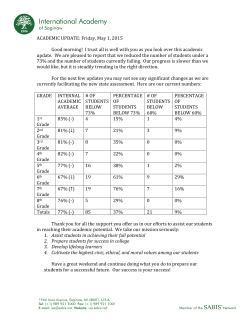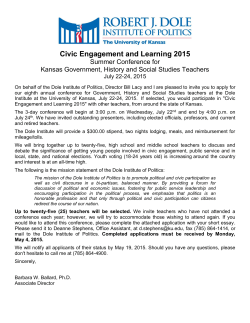
executive summary - Nebraskans for Civic Reform
2015 NEBRASKA CIVIC HEALTH INDEX A Project Funded by the Weitz Family Foundation E X EC U T I V E S U M M A RY Robust civic health leads to many benefits for communities, such as resilient economies, representative and accountable governments, and higher social capital. This report – the first-ever Civic Health Index for the state of Nebraska – documents Nebraskans’ rates of interacting with neighbors, communicating with family and friends, having confidence in public institutions, being members of groups, volunteering and giving, registering and voting, and being involved in politics. These indicators give us a picture of the state of civic health in Nebraska and this report provides a data-based roadmap for strengthening engagement throughout the state. The results show that in relation to other states, Nebraskans perform well in many indicators of civic health, particularly in activities related to social connectedness (e.g. eating dinner with household members) and confidence in institutions. The state’s weakest area of civic health is political involvement (e.g. voting, contacting public officials). This report posits five critical action steps to strengthen civic health in Nebraska: ACTI0N #1 The ultimate goal is to promote leadership, service, and transformational opportunities for emerging generations to create the communities of their dreams that will attract and retain young people for generations to come. Continue to grow the strong tradition of connecting all Nebraskans. The Data: Nebraskans display strong social connectedness, particularly in interpersonal relationships. The vast majority of Nebraskans (92.7%) report eating dinner with other members of their household frequently, a rate that is second highest in the nation. And, 82.3% of Nebraskans reported seeing or hearing from friends or family frequently. The Goal: Social connectedness ranks among Nebraska’s strongest areas of civic health. Ensuring that social connections remain strong and growing to include all Nebraskans is critical to the future of civic health in our state. ACTI0N #2 Create and promote accessible networks for community engagement. Use online social media to connect community members and projects. The Data: The youngest Nebraskans have the lowest rates of participation in most indicators of community engagement. More than 50% of all Nebraskans 25 and older report donating to a charity; however, only 19.5% of 18-24 year-olds report charitable giving. Only 3.4% of 18-24 year-olds reported attending a public meeting. The data show that the youngest Nebraskans – a generation that tends to use new and modern methods of communication – are the least engaged in their communities of all age groups. The Goal: Volunteering, attending community meetings, and even working with neighbors looks different today than ever before. Not only are community members increasingly accessible via social media, many go online to search for news, entertainment, and activities. Communities need to adopt the strategies and cultural changes to create inviting opportunities for 21st century participation. This means putting in place the baseline technologies and messaging platforms that enable utilization of powerful online social media resources. These resources can then be used to target community members for civic activities. But, this is just the first step. Successful communities will use new channels for engagement to create and design programs with 21st century Nebraskans, not just for them. This includes seeking active participation in unique ways from young and diverse groups, and then listening to what they have to say. The ultimate goal is to promote leadership, service, and transformational opportunities for emerging generations to create the communities of their dreams that will attract and retain young people for generations to come. 4 N E B R A S K A C I V I C H E A LT H I N D E X ACTI0N #3 Activate Nebraskans to register and vote by modernizing the process. The Data: In the 2012 election, only 69.5% of Nebraskans registered and only 61.6% voted. These rates rank Nebraska 32nd and 36th, respectively, compared to other states and the District of Columbia. The Goal: Increase voter registration and voting rates in both local and national elections, primarily within groups that show lower rates of civic participation. Voting and registration are among Nebraska’s weakest areas of civic health. These critical elements of participatory democracy are only fully realized if as many citizens 18 and older participate as possible. As a state, raising rates of voting and registration among all Nebraskans and particularly among the youngest voters, whom data show have participated the least, will strengthen civic health. ACTI0N #4 Increase interaction between elected representatives and constituents. The Data: Only 12.2% of Nebraskans reported contacting or visiting a public official, ranking the state 27th compared to other states and the District of Columbia. The Goal: Public officials should provide electronic and in-person means of connecting with other Nebraskans. Just as family and individual schedules can be barriers to Nebraskans attending and participating in community engagement, those restrictions can limit their access to public officials. Being accessible online and using social media to promote in-person interaction will increase participation in this type of civic engagement. ACTI0N #5 Prioritize civic education that fosters civic action for all students in Nebraska. The Data: Participation in most indicators of civic health, particularly those related to political involvement, increases with education. 84.0% of Nebraskans with a bachelor’s degree or higher reported voting in local elections sometimes or always. Similarly, Nebraskans with a bachelor’s degree or higher voted at a rate of 74.6% in 2012, compared to the state average of 61.6%. The data show that education can provide critical tools that enable individuals to fully engage in their communities, and these types of opportunities should be available to all Nebraskans. The Goal: Many indicators of civic health, especially those of political involvement and community engagement, require knowledge about the power of citizens in a democracy. Educational attainment is shown to be a predictor of higher rates of participation in a number of indicators of civic health. This suggests education powerfully influences a person’s willingness to engage in civic life. K-12 and higher education institutions should provide civic education opportunities that engage all students with civic participation, supplying students with the real-world tools to continue to take civic action into the future. Nebraska schools and state leaders should continue to prioritize this type of civic learning. Nebraska Civic Health Partnership (NCHP) is dedicated to addressing and strengthening civic health and education throughout the state. For more information on civic data or resources for strengthening civic health in your community, contact NCHP manager Kelsey Arends at Nebraskans for Civic Reform - (402) 904-5191. 5
© Copyright 2025









